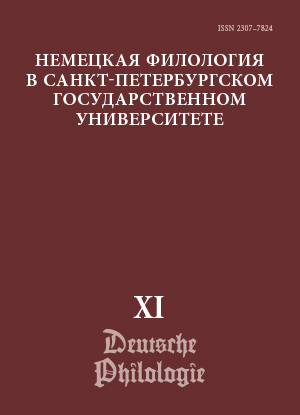National and cultural originality of communicative interaction in distant eras (based on the material of the T. Fenne’s German-Russian phrasebook, 1607)
Abstract
The first bilingual phrasebooks were created for the implementation of business and everyday communicative interaction of representatives of different languages and cultures and serve as written samples of business intercultural communication, reflecting national-specific and intercultural relations (personal and interstate) of a distant era. The article provides a comparative typological analysis of communicative business and everyday situations, described by means of both native and foreign languages and reflecting the national linguistic picture of the world and elements of intercultural communication of an era distant from us as the opposition “ours and others”. Particular attention is paid to the description of the main situations of communication, their linguo-pragmatic markers and components of intercultural interaction (addresses, formulas for maintaining a conversation, argumentation, expressions of request, politeness, rudeness, taking into account religion, mentality, proverbs and sayings, etc.). For the analysis, the Low German-Russian phrasebook by the Hanseatic merchant Tonny Fenne, created in Pskov in 1607, is used — a handwritten textbook on the study of the Russian language by German merchants, which reflects not only the linguistic picture of the world, but also provides samples of verbal nationally marked behavior of Russians and Germans in the process of their business interaction during the Hanseatic League. Using the example of modeling various business situations, the article shows how in the process of communication and mutual understanding of two peoples, commercial and cultural and cognitive motivations expand and intertwine. The knowledge about the world reflected in the phrasebook is of a transitory nature, therefore its value lies in the fact that it is a source of linguocultural and historical information of a certain period and lays the foundations for future relations.
Keywords:
phrasebook, business communication, communicative practice, intercultural communication, dialogue, appeal, proverb, linguistic picture of the world
Downloads
References
Литература
References
Downloads
Published
How to Cite
Issue
Section
License
Условия передачи авторских прав на статьи и рецензии, опубликованные в ежегодном периодическом издании «Немецкая филология» регулируются условиями Лицензионного Договора автора с Санкт-Петербургским государственным университетом. В соответствии с Лицензионным Договором опубликованные материалы находятся в открытом доступе, а авторам бесплатно предоставляется неограниченные возможности их распространения и самостоятельного архивирования.




